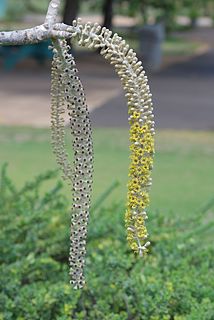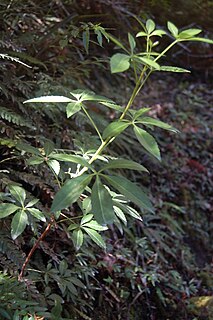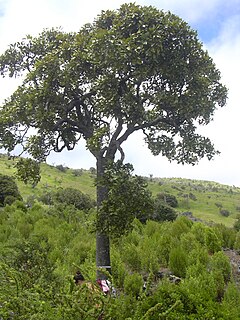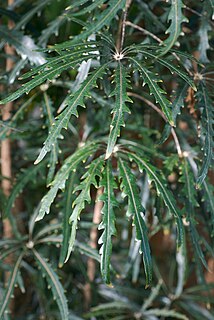
GastoniaCommerson ex Lamarck is a formerly accepted genus of flowering plants in the ivy and ginseng family, Araliaceae. It had been known as an unnatural group, but was recognized as late as 2010, when its nine species were distributed to four different subgenera of the large genus Polyscias. Because the genus Gastonia is now obsolete, its species are herein referred to by their names in Polyscias.

Indigofera is a large genus of over 750 species of flowering plants belonging to the pea family Fabaceae. They are widely distributed throughout the tropical and subtropical regions of the world.

Macaranga is a large genus of Old World tropical trees of the family Euphorbiaceae and the only genus in the subtribe Macaranginae. Native to Africa, Australasia, Asia and various islands of the Indian and Pacific Oceans, the genus comprises over 300 different species. It was first described as a genus in 1806, based on specimens collected on the Island of Mauritius.
Argomuellera is a genus of plant of the family Euphorbiaceae first described as a genus in 1894. It is native to sub-Saharan Africa, Madagascar, and the Comoros Islands.

Schefflera is a genus of flowering plants in the family Araliaceae. With an estimated 600–900 species, the genus represents about half of its family. The plants are trees, shrubs or lianas, growing 4–20 metres (13–66 ft) tall, with woody stems, the absence of articulated pedicels and armaments, and palmately compound leaves.

Polyscias racemosa, or false 'ohe, is a species of flowering plant in the family Araliaceae. As Munroidendron racemosum, the species was until recently considered to be the only species in the monotypic genus Munroidendron. With the change in classification, Munroidendron is now obsolete. Polyscias racemosa is endemic to the Hawaiian island of Kauai. It is very rare in the wild and some of its original habitat has been replaced by sugar cane plantations. It was thought for some time to be probably extinct, but was rediscovered a few years prior to 1967.
Arthrophyllum is a defunct genus of flowering plants in the family Araliaceae. It was recognized by most authors until 2010, when all of its 30 species were "sunk" into ''Polyscias'' subgenus Arthrophyllum.

Brassaiopsis is a genus of shrubs of family Araliaceae. There are about 45 species, distributed in Asia from the Himalaya through China, Vietnam, Thailand to Indonesia.

Cheirodendron is a genus of flowering plant in the family Araliaceae. All six species in the genus are endemic to Polynesia. The five Hawaiian species are generally called ʻōlapa, and occur in wet forests on all major islands as well as some mesic forests, such as Kipuka Puaulu.
Cuphocarpus is an obsolete genus of flowering plants in the family Araliaceae. Mabberley (2008) treated it as a synonym of Polyscias, but other authors still recognized it at that time. In 2010, in a phylogenetic analysis of DNA sequences, it was shown that Cuphocarpus was biphyletic and embedded in the large genus Polyscias. In an accompanying paper, Polyscias was divided into 11 subgenera, with seven species left incertae sedis.

Polyscias is a genus of flowering plants in the family Araliaceae. They bear pinnately compound leaves.

Raukaua is a genus of flowering plants in the family Araliaceae. It has an austral distribution, being indigenous to southern Argentina and Chile, as well as New Zealand and the island of Tasmania.

Reynoldsia is an obsolete genus of flowering plants in the ivy family, Araliaceae. In 2003, Kew Gardens published a checklist for Araliaceae, in which eight species were recognized for Reynoldsia: four from Samoa, two from Tahiti, one from the Marquesas, and one from Hawaii. In 2010, a phylogenetic comparison of DNA data showed that Reynoldsia was polyphyletic, consisting of two groups that are not each other's closest relatives. In a companion paper, three of the species were "sunk" into synonymy with others, reducing the number of species to five. All species that were formerly in Reynoldsia are now in ''Polyscias'' subgenus Tetraplasandra, a subgenus of 21 species indigenous to Malesia and Pacific islands.

Tetraplasandra is an obsolete genus of flowering plants in the ivy family, Araliaceae. They are small to medium trees, of mesic to wet forests.
Polyscias verrucosa is a species of plant in the family Araliaceae. It is endemic to French Polynesia.

Plerandra elegantissima, the false aralia, is a species of flowering plant in the family Araliaceae, native to New Caledonia.

Delarbrea is a genus of plants in family Myodocarpaceae, which contains only one other genus, Myodocarpus.
Plerandra actinostigma is a flowering plant in the family Araliaceae. It was first described in 1968, as Schefflera actinostigma, and is endemic to Vanuatu.
Plerandra nono is a species of flowering plant in the family Araliaceae. It is endemic to New Caledonia.













